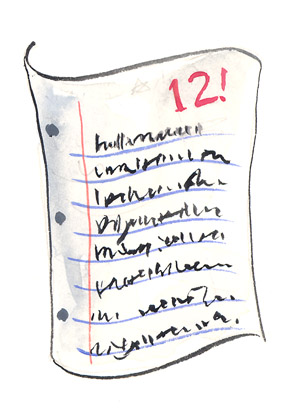 Hi and welcome to my SAT prep blog! Be sure to join my email list so I can send you exclusive subscriber-only tips to help you!
Hi and welcome to my SAT prep blog! Be sure to join my email list so I can send you exclusive subscriber-only tips to help you!
Today we’re going in-depth into tips and insights about the SAT essay.
Specifically, we’ll dig into some valuable thoughts and info about the SAT Essay prompts themselves – the essay questions and topics that you’ll deal with on the day of the test.
There’s a lot of (mostly-wrong) advice about the SAT Essay out there, but here’s why you should want to read this “SAT Essay Prompts” post instead of someone else’s –
Simply put, I know exactly what I’m talking about and have the numbers to prove it:
- I have a 2400 SAT Score
- I get consistent, stress-free 11s and 12s on the SAT essay
- I’ve written 5 books on SAT prep (including essay strategy and evidence)
- I’m the creator of the Conquer SAT Vocabulary video course!
- I’ve tutored over 200 SAT prep students to higher scores
- I want to help you, more than anyone else in the world!
If you’re looking for definitive, concrete information about the essay prompts from a true SAT expert, then read on…
First things first – expose yourself to a list of SAT essay prompts:
This is how I start all SAT essay lessons with my private tutoring students – by having them read through a long list of actual SAT essay prompts from earlier tests.
Following this step at the beginning makes it easier to talk about the nature of the prompts later on, but we both need to have looked at a bunch of different SAT essay questions to make sure that you and I are on the same page.
Here’s a link to a list of of SAT essay prompts.
Get Exclusive SAT Prep Tips!
I want to send you more tips to help your SAT score, but I need your email address to stay in touch. Enter your email below so I can send you my reports on the SAT and other subscriber-only bonuses.
Read through the list for a few minutes. Go ahead, I’ll wait. Then come back and we’ll talk. (Make sure you come back here afterwards for all my pro insights!)
…
Are you back?
Great, then let’s take a closer look at what you just read.
SAT Essay Prompt Themes and Archetypes
What’s an archetype? I’m using the term somewhat loosely, I admit:
In this case I mean one “umbrella” prompt category that could contain multiple different specific prompts.
For example, you may look at 3 different types of animal: A German Shepherd, a Great Dane, and a wild wolf – and despite their obvious differences on the surface, we can still determine they are variations of the “Canine” or “Dog” Archetype.
Similarly, there are common themes for SAT essay questions that re-appear again and again.
For example, despite surface differences in wording and phrasing, two different prompts may ask the test-taker to speculate about the value of “Creativity.”
Here are some of the most common archetypal categories:
- Creativity
- How to succeed
- Individualism vs Collectivism
- Authority – Obey it or fight it?
- Traditions – Keep them or change them?
- Technology, Progress, and Current Events
If we zoom out even farther above these archetypes, we can try to make some broad, sweeping generalizations about all SAT essay prompts.
(By the way, if you have any of your own insights about what SAT essay prompts all have in common with each other, please leave them in the comments and I may include them in my next revision of this post! Many of “my best ideas” have actually come from students and blog readers.)
What do all SAT Essay prompts have in common with each other?
Before you read further, pause to answer this question for yourself – I’m constantly amazed and surprised by the brilliant insights my students come up with on their own!
If you come up with some commonality that they all share, and I haven’t listed it below, please help our other readers by sharing it in the comments!
Here’s my list of traits that all the SAT essay questions share with each other:
1) SAT prompts make you take one side or the other:
All the prompts present you with two clear options. Your essay will be more successful if you pick only one side and support it with evidence without getting into grey area and without trying to argue both sides (25 minutes is not enough time to make great points in this manner).
- Prompts all have a “yes” or “no” side
- There’s never a “right answer”
- Either side can be equally-well supported
- One side will often feel easier to argue for
A note about that bottom bullet point: you may have a “gut instinct” or personal leaning on the prompt. You know, some passion, or personal viewpoint that motivates your deepest beliefs… but ignore it and go with what’s easier to argue.
When I first got a 12 out of 12, I remember very clearly arguing against what I would normally say (if I was talking with my friends or family, for example).
In other words, I was willing to put my personal beliefs aside for 25 minutes and focus on an opposing viewpoint, because I believed (correctly) that I could more efficiently support the opposing side.
It was a decision motivated by practicality, not idealism, and I suggest you make the same choice when the time comes to write your own SAT essay.
2) The prompts are designed to draw out arguments, not factual info
The prompt is designed to get at your writing SKILLS, not your factual KNOWLEDGE.
In fact, you’re not even graded on the accuracy of your supporting facts. Check out my post about telling lies on the SAT essay.
No SAT essay prompt is designed to test what you know about the SAT essay question, but rather what you can argue about it.
It’s a mindset shift from “Is this true?” to “Is this relevant?“
3 SAT Essay Prompt Secrets:
 Take a second to think about why exactly you need to include supporting evidence in your SAT essay.
Take a second to think about why exactly you need to include supporting evidence in your SAT essay.
Why is it so important to the essay graders that you have examples that support your thesis?
Well, I think it comes down to this:
Evidence makes your argument longer and it makes your argument more convincing.
Clearly, the more convincing essay is going to deserve a higher score.
Perhaps not-so-clearly, the longer essay is also going to get a higher score. I write about the best length for your SAT essay in this post.
Now let’s look at three specific secrets about SAT essay evidence that will make it easier to provide lengthy, convincing arguments in the short span of 25 minutes.
Secret #1 – Making up evidence can help your score…
As referred to above, and in this post, making up evidence cannot hurt your score.
In fact, making up specific, supportive details (like a scientific study, a novel, a short stort, a quotation…) will bring life and power to your argument when used effectively.
Secret #2 – Personal evidence is fine…
There’s even personal evidence in the examples of 12-essays that the College Board gives out.
I don’t really like using personal evidence, because it tends to lead to students becoming distracted as they reminisce about their lives while trying to find the perfect example to use.
Still, it has a time and a place, and I just wanted to clear up any misunderstandings about personal evidence not being acceptable on the SAT – it’s totally fine to use it.
Secret #3 – Where evidence comes from doesn’t matter…
This is the kicker that most “professionals” will never fully understand.
When responding to your SAT essay prompt, you need to know that where your evidence comes from doesn’t matter in the slightest. That’s not what you’re being graded on.
It doesn’t matter if you lie, tell stories about your life, use fictional books as references, etc.
The only thing that matters about your evidence is whether or not it provides support for your argument.
BTW, Pre-Writing Your SAT Essay Is a Bad Strategy
Ok, I want to discourage a certain strategy here.
Now, this is going to sound crazy to some of you, but believe it or not, there are companies and tutors out there that recommend following the “Prewriting Strategy.”
It’s what it sounds like – writing an essay before the day of the test (complete with specific evidence), and then adapting it to the specific prompt you get on test day.
(Ok, does this just sound CRAZY to anyone else? I have literally no idea how this became a reasonable strategy)
While it’s essential to have a plan going into the test, it’s simply too inflexible and rigid to pre-write your entire essay, with too much risk of getting a prompt that won’t fit.
We have to find a different SAT essay strategy – one that will always work.
I have a super-secret SAT Essay strategy I haven’t revealed yet:
I’ve been thinking a lot lately about the SAT essay – writing posts, teaching lessons about it, and re-examining everything I thought I knew about it.
So, just last month, I think I took my greatest leap yet into the realm of deep SAT essay strategy.
I haven’t yet released this newest strategy on the internet, since it honestly has replaced my old strategies and methods of thinking.
I’ve noticed that once you “get” how this new essay strategy works, it’s difficult to imagine ever returning to another way of doing things.
Why is this super-secret, not-yet-revealed-to-the-internet strategy better than any other SAT Essay method?
- It’s faster than any other strategy
- It requires less brainstorming
- It requires less advance preparation
- Students “get it” twice as fast as my previous method
- It’s way more fun to use than other methods
- It abuses the loopholes of the SAT essay rules
I’m actually getting really excited about releasing this new method to my online readership.
However, there are a couple of things slowing down the release, which are:
- My local tutoring business has exploded for end-of-the-year testing dates
- I want to make sure I do a good job of explaining it
- I haven’t decided what to do about my “old” SAT essay methods – retire them? Add to them? Change them completely?
I will say that my older, “classic” SAT Essay strategies and advice are still excellent ways to raise your score.
The “old ways” were based on lots of thought and research, as well as practical testing and teaching experience, and they still work.
However, I feel my new secret method has really gone beyond the limitations of what everyone else is doing. You can read more about it here.
For more SAT essay strategy and example evidence, order my SAT prep books today!
Further Reading:
What is the SAT Essay?
The Liar’s Perfect Score SAT Essay Template
Top 5 Historical Examples for the SAT Essay
What is the Best SAT Essay length?
What Exactly is on the SAT Writing Test?
Additional Resources:
Write the Best SAT Essay of Your Life (e-Book)
Top 30 Examples to Use as SAT Essay Evidence (e-Book)
Conquer SAT Vocabulary (Video Course)
One last thing – to stay in touch with me about SAT prep, join my FREE SAT mailing list before you leave so I can send you the best subscriber-only content and tips!


















Hello, I just saw your blog and it is really helpful !
I am emailing you to ask if you would give me a sample examples (history and literature) for SAT essay. I hope to buy one of your books but I cannot afford it since I am really poor…. I am studying SAT alone for september test. My only problem is essay.
Please give me your hand…
I will appreciate you !
Thanks for reading my letter : )
I love your website. I’m from the Caribbean region, Trinidad and Tobago to be exact and I really appreciate your insight given to SAT students. You’re witty and logical and I admire your style to achieve success. Thank you!